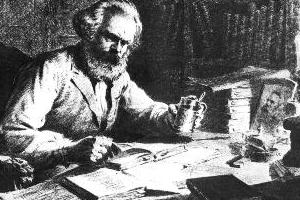

|
Study Guide for |
In the social production of their life, men enter into definite relations that are indispensable and independent of their will, relations of production which correspond to a definite stage of development of their material productive forces. The sum total of these relations of production constitutes the economic structure of society, the real foundation, on which rises a legal and political superstructure and to which correspond definite forms of social consciousness.
Terms: Production and Consumption, Relations of Production,
Questions for discussion:
1. Can you describe changes in the relations of production that have taken place in your own country over the past 50 or 100 years and see some distinct stages in their development?
2. Can you describe changes that have taken place in the “legal and political superstructure” over the same period?
3. Why do think the Anti-slavery movement happened when it did (early 19th century) and not some other time?
The mode of production of material life conditions the social, political and intellectual life process in general. It is not the consciousness of men that determines their being, but, on the contrary, their social being that determines their consciousness.
Terms: Being, Consciousness.
Questions for discussion:
1. Can you give some stereotype examples of people in different jobs or different types of society, and how their view of the world may be conditioned by how they live?
2. Some things are timeless, like the characters in Shakespeare's plays. Can you suggest some aspects of consciousness that do not appear to be conditioned by “the mode of production of material life”?
3. Why do think (the third wave of) the Women's Liberation movement happened when it did?
At a certain stage of their development, the material productive forces of society come in conflict with the existing relations of production, or — what is but a legal expression for the same thing — with the property relations within which they have been at work hitherto. From forms of development of the productive forces these relations turn into their fetters.
Terms: Property, Productive Forces.
Questions for discussion:
What would this paragraph tell you about:
1. China's current attempts to modernise their economy?
2. The growing role of the internet?
3. Globalisation and the alleged threat to the “nation-state”?
Then begins an epoch of social revolution. With the change of the economic foundation the entire immense superstructure is more or less rapidly transformed. In considering such transformations a distinction should always be made between the material transformation of the economic conditions of production, which can be determined with the precision of natural science, and the legal, political, religious, aesthetic or philosophic — in short, ideological forms in which men become conscious of this conflict and fight it out. Just as our opinion of an individual is not based on what he thinks of himself, so can we not judge of such a period of transformation by its own consciousness; on the contrary, this consciousness must be explained rather from the contradictions of material life, from the existing conflict between the social productive forces and the relations of production.
Questions for discussion:
What would this paragraph tell you about:
1. The slogans of the French Revolution: “Liberty, Equality, Fraternity”?
2. Martin Luther's demand that the Bible be published in the language of the people?
3. Workers' demands for higher wages?
No social order ever perishes before all the productive forces for which there is room in it have developed; and new, higher relations of production never appear before the material conditions of their existence have matured in the womb of the old society itself. Therefore mankind always sets itself only such tasks as it can solve; since, looking at the matter more closely, it will always be found that the tasks itself arises only when the material conditions of its solution already exist or are at least in the process of formation.
Terms: Contradiction, Dialectics.
Questions for discussion:
What would this paragraph tell you about:
1. The rise of the national liberation movements in the 1940s, 50s and 60s?
2. The growing worldwide anti-WTO movement?
3. The fact that so many people still believe in creationism, so many years after Darwin?
In broad outlines Asiatic, ancient, feudal, and modern bourgeois modes of production can be designated as progressive epochs in the economic formation of society. The bourgeois relations of production are the last antagonistic form of the social process of production — antagonistic not in the sense of individual antagonisms, but of one arising form the social conditions of life of the individuals; at the same time the productive forces developing in the womb of bourgeois society create the material conditions for the solution of that antagonism. This social formation brings, therefore, the pre-history of society to a close.
Terms: Slave Society, Feudal Society, Bourgeois Society.
Questions for discussion:
1. What is the difference between a slave and a wage-slave?
2. In what way did feudal society suit a society based on small-scale agriculture?
3. What is it about society today which makes socialism possible in a way which it wasn't 100 years ago?
4. What is it about society today which makes socialism necessary in a way which it wasn't 100 years ago?
Andy Blunden, 2002